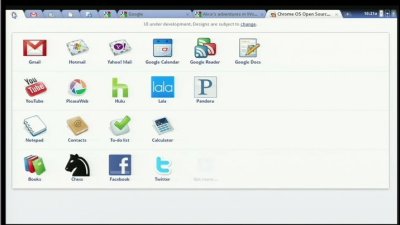I’m watching Google’s press briefing on the forthcoming Chrome OS. It is amazing. What Google is developing is a computer that answers several of the problems that have troubled users since the advent of the personal computer.

Exaggeration? Here’s a quick summary of what Chrome OS is. It’s a device that you will purchase which runs in effect just the Chrome browser. All storage is solid-state, it boots in a very short time – a few seconds.
The Chrome browser is somewhat modified. It has “application tabs” – on the top left below – which represent web applications that you use.

It also supports panels, windows which float above the browser. Use case: Google Talk, there while you browse other web pages.
All the data is online, apart from a user area that is a cache of online data. All binaries in Chrome OS are signed and inspected on start-up. They are known binaries, because the user will never install an application – only a browser extension, maybe, which will come via Google. Google is not planning to support anything other than web applications.
This has two implications. One is that stronger security is possible. If any binary is added or modified, that can easily be detected; it is a white-list approach. In the event of a problem, the machine can be re-imaged, making it clean.
Second, if your Chrome OS computer breaks or is stolen, or re-imaged as above, it’s no hassle. You can simply buy a new device, log back on, and all your data is there.
There will be offline support, with automatic synchronization to your online store.
At top left is a start button app button which opens an application-centric Favourites menu.

If you double-click a document, it opens on the Web. If it is an Excel document, for example, it might open in the Excel Web App, which Google rather gleefully demonstrated.

Will this be good? Yes. Cheap, fast, effective. Stream music. Run any web application.
What about the dark side of Chrome OS? That is easy to spot. The security model depends on Google knowing about all the binaries and browser extensions. If you have a binary which Google does not want to approve – “there is no certification process for an alternative web browser”, we were told – you have no way round Google’s control.
Alongside that, you will naturally see Google’s applications and identity management woven into the product. It gives Google huge power over its users. It could make Microsoft’s monopoly look trivial.
In mitigation, everything in Chrome OS is open source, and it draws on open source projects such as Web Kit.
I am sure there will be much debate on the implications of today’s announcement, but count me highly impressed – though Google acknowledges that this is not going to be a computer for every purpose.
It could nevertheless meet a large subset of computing needs; which will gradually grow as it matures.
More info here.
Are the apps cached on the device as well? I assume so, otherwise if you are out of range of the intarwebs the thing is a brick…
Michael
I’m guessing this is handled by Google Gears, which lets you run web applications offline. Obviously the web app has to be written specifically to support this.
Tim
It’s getting near to a games console, where all apps are licensed, things rarely crash (barring hardware errors) and you have a simpler experience navigating around.
Google already has a tonne of our personal data – emails, blogs, searches, etc… – with Chrome, they will have actual computer usage statistics: where you surf on the net, what you do, buy, who you talk to, etc…
Just because Chrome is Open Source doesn’t mean Google’s Privace Policy is open. What will they do with user data? In fact, what are they doing with it now, and how will this change after Chrome is rolled out? Will they make their policy open and scrutable to users and interested parties? What’s to stop government agencies from employing Google as an information gathering operative (remember, they have already had to turn over data in specific cases)?
Thanks, but no thanks, Mountain View!
While they didn’t say “Gears” they did mention “HTML5 offline access.”
There was an interesting moment during the Q & A. When asked about Silverlight the answer was they will have more to say about plugins and how binaries are installed in the future. When asked if they were working with Microsoft the answer was a terse “no comment.” After mentioning that Flash works and that they are committed to Flash (codecs etc) that was interesting – not sure what it really means. Perhaps some plugins will be available and some will not?
On privacy, they may have a better story to tell than most people think. But they don’t seem to understand the need to explain exactly what data they will store and how they will use it. Maybe the press briefing wasn’t the place for lots of detail. But the answer to those types of questions are important. Some information is here:
http://www.chromium.org/chromium-os/chromiumos-design-docs/security-overview
and here:
http://sites.google.com/a/chromium.org/dev/chromium-os/chromiumos-design-docs/user-accounts-and-management
The security features may be very appealing in an enterprise environment – especially if an enterprise version of Chrome OS connects to enterprise servers behind a firewall to store config and personal information instead of Google storing it on Google’s servers. Since it is all open source, that may not be too difficult for third parties to build without much help from Google.
Yep as you stated Tim, its just going to be another monopoloy a la M$ really. Net appliances are nothing new, Ellison was touting the ‘NC’ back in the 90s. I guess the biggest changes are ubiquitous (and more reliable) high speed net access and being able to deliver richer UIs using html/javascript.
I’m not sure many large scale organisations will be quick to embrace it unless they can have a server component too which enables them to keep the data in-house.
Gary